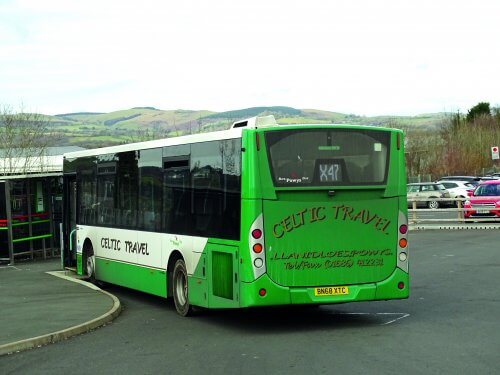
Leading figures in the public sector and the bus industry have signed a new agreement to deliver better bus services that meet the objective of an integrated transport system.
The agreement has been signed by bus operators, local authorities, Transport for Wales and the Welsh Government.
Under the terms of the agreement operators will be required to provide bus services that meet local needs. It will seek to ensure everyone works together to support the recovery of the whole network. Priorities will include supporting learners’ journeys to school, increasing services in situations where demand exceeds capacity, and supporting economic recovery.
The agreement will also support integration across transport modes through things like smart ticketing and integrated timetabling. It will provide a framework for closer partnership working between the public sector and bus operators.
Lee Waters MS, Deputy Minister for Economy and Transport said: “Through the Covid-19 pandemic, we have supported the bus industry to keep essential services running and allow key workers to get to work to help keep our society functioning and to provide support and care to those in need. We will continue this support as we take the first steps out of the lockdown and demand for public transport returns.
“The ‘Bus Emergency Scheme (BES) 2’ is a key part of our support as we move forward. It is an agreement between bus operators, local authorities, Transport for Wales and the Welsh Government and provides the basis of partnership working to deliver better services.
“Under the terms of the agreement operators will be required to provide bus services that meet local needs. It will ensure operators are incentivised to support the recovery of the whole network, improve standards, and build a lasting partnership with the public sector.
“Included with this agreement is an additional £37.2 million of funding to continue to support the bus industry in the coming financial year. This will give further reassurance to bus operators, enabling them to plan for the future. This is in addition to the £90 million which the Welsh Government already spends annually on supporting the industry and enabling concessionary travel.
“BES2 will ensure the support provided to bus operators is more closely aligned with Llwybr Newydd, the Welsh Government’s new transport strategy. It will set the foundation for the more detailed National Bus Strategy which will be prepared to support Llwybr Newydd and will set out the Welsh Government’s plans for further reform of the bus industry.”
Joshua Miles, CPT Cymru Director, said: “The Bus Emergency Scheme (BES) partnership is good news for bus passengers throughout Wales. It sets up a clear mechanism by which BES partners will support passengers back on to public transport with confidence as restrictions are lifted.
“Through BES all partners may now work closely together to build back better for the future. The commitment towards developing bus priority measures, enhanced ticketing solutions and vehicle initiatives will be crucial in reducing congestion and the transition towards zero emission vehicles.
“Travel by bus is an important part of getting our lives back to normality. The BES partnership will help the nation recover from Covid-19 and drive further improvements for bus passengers in Wales.”
Scott Pearson, Chair of CaBAC – Coach and Bus Operators Cymru, representing the SME operators in Wales – said: “We are pleased to have played a full part in the discussions on the future of the bus industry in Wales leading to this agreement. Building on the support from the Government over the past 12 months, our members will now want to work with our partners in the Government, TfW and Local Authorities to secure and improve passenger services across Wales.”
CBW will take a closer look at the Llwybr Newydd document in more detail in the next issue.

